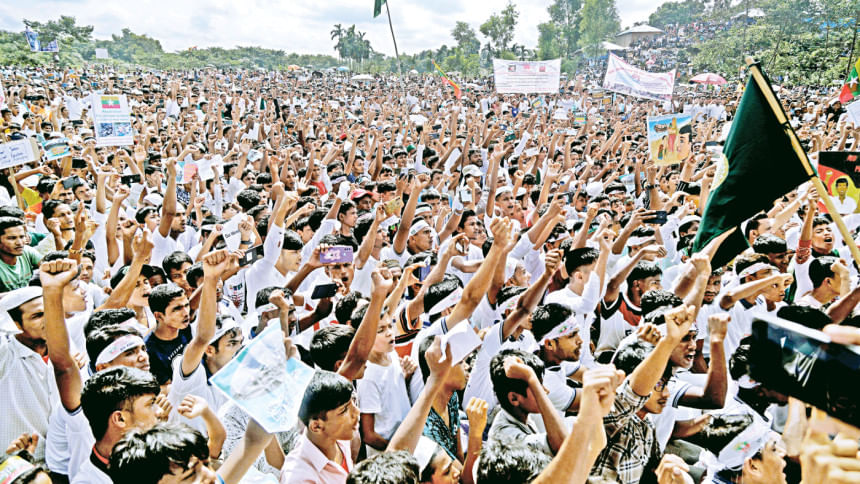‘We want justice, we want accountability’

Justice and accountability for atrocities against the Rohingyas must remain central to any resolution of the crisis, speakers said at a stakeholders' dialogue in Cox's Bazar.
Nicholas Koumjian, head of the Independent Investigative Mechanism for Myanmar, stressed the urgency of holding perpetrators accountable, saying the Rohingya want to return home safely and rebuild their lives.
"We want justice. We want accountability," he said, citing evidence of civilian targeting by both the Myanmar military and other armed groups, including drone strikes and executions in violation of the laws of war.
Speaking on the second day of the three-day event yesterday, Koumjian urged decisive international action, noting that long-term solutions require both legal accountability and political will.
The three-day dialogue aims to engage global stakeholders in finding solutions to the prolonged crisis and relay the takeaways to the High-level Conference on the Situation of Rohingya Muslims and Other Minorities in Myanmar at the United Nations Headquarters in New York, which is scheduled to begin on September 30.
Huma Khan, head of OHCHR Bangladesh, said justice provides the guarantee of non-recurrence.
She outlined the pillars of transitional justice -- truth, justice, reparations, and guarantees of non-recurrence -- with memorialisation as a new element, but noted that Myanmar's ongoing ethnic cleansing challenges the immediate implementation of such processes.
She also stressed complementary local justice mechanisms alongside international processes, citing crimes by both the Myanmar military and armed rebel group the Arakan Army over the past year.
Antonietta Ann Trapani, programme coordinator of Legal Action Worldwide, pointed to recent progress: 25 arrest warrants issued in Argentina under universal jurisdiction, ongoing International Criminal Court investigations, and the case brought by The Gambia at the International Court of Justice.
She stressed that justice goes beyond court judgments to reparations, the restoration of citizenship, and recognition of the Rohingya as equal members of society.
"Justice is ensuring that children who survive will never again face the same persecution," she said, calling for an integrated approach at international, regional, and local levels.
Rohingya diaspora representative Nay San Lwin urged global action against ongoing crimes by both the Myanmar military and Arakan Army.
He called for ICC cases to be expanded to cover the Arakan Army and for stronger international pressure to ensure ICJ rulings are enforced, stressing that transitional justice, reparation, and security are essential for the safe and permanent return of the Rohingyas.
Addressing humanitarian challenges, Juliette Murekeyisoni, deputy representative of UNHCR Bangladesh, highlighted critical funding shortages affecting 1.1 million Rohingya refugees in Cox's Bazar.
Aid cuts, she said, have strained food, shelter, education, and protection services, particularly for women and children.
"We must involve refugees themselves in these processes and ensure they acquire skills and education to rebuild their country when conditions allow safe return," she said.
Lance Bonneau, chief of International Organization for Migration's Bangladesh mission, stressed a dual approach of providing essential services while preparing refugees for voluntary, dignified, and sustainable repatriation.
He cited achievements in literacy, skills development, and the Rohingya Cultural Memory Center, underscoring the importance of preserving culture and preparing refugees to contribute to Myanmar's future.
Lucky Karim, executive director of Refugee Women for Peace and Justice, echoed the urgency of improving conditions for both camp residents and internally displaced Rohingya within Myanmar.
She called for a medium-term plan to protect remaining populations and sustained international support to prevent further loss of life and ensure a safe, dignified, and permanent return.


 For all latest news, follow The Daily Star's Google News channel.
For all latest news, follow The Daily Star's Google News channel. 



Comments